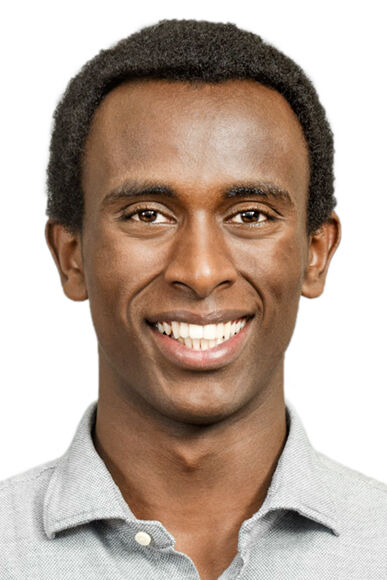- Fellow Highlights
Looking Back at the Fellowship: PhD Student Biya Haile
2021 Paul & Daisy Soros Fellow Biya Haile was born and raised in Addis Ababa, Ethiopia. A natural engineer, he worked in his dad’s workshop and volunteered at automotive garages from the age of 10—beyond working on cars, Biya was always building simple devices to resolve problems in his community, such as a sprinkler made of used PVC pipes to help cultivate indigenous trees. These projects quickly developed into a passion that set Biya on a path to study engineering and nanotechnology.
Biya was 10 when his mother emigrated to Kenya and then the United States to escape poverty and a corrupt government that was constantly oppressing people like her based on her Oromo ethnic identity. Seven years later, Biya and his two sisters immigrated as refugees and joined their mother in Norcross, Georgia. Optimistic about high school in the US, Biya quickly learned English by reading books and watching movies like Ice Age. He worked hard to rank in the top five percent of his high school class, becoming a standout in running and lacrosse, and earning several college scholarships.
While studying at Kennesaw State University, Biya became an airplane mechanic and learned to fly aircrafts such as the Cessna 150 and 172, before transferring to Georgia Tech to pursue a degree in mechanical engineering. Since the summer of 2018, Biya has researched in Georgia Tech’s Institute of Electronics and Nanotechnology under Professor Oliver Brand, developing microelectromechanical systems-based gas sensors. Biya balanced research with a student assistantship in the micro-fabrication department with Dr. Hang Chen. Despite a demanding personal and professional schedule, he earned a 2019 Goldwater Scholarship and received a 2019 Tower Award for outstanding academic performance. As a UN Millennium Fellow, Biya leads a team engaging Georgia Tech students with refugees in the Atlanta-area by organizing events that support refugee communities.
We caught up with Biya about what’s next and what the Fellowship has meant to him:
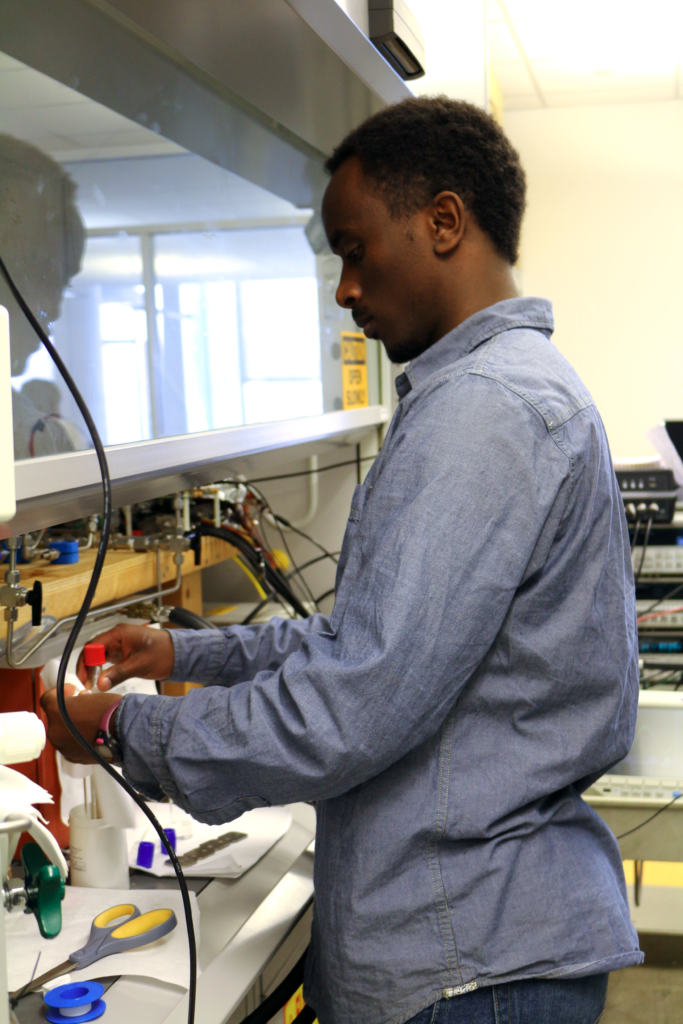
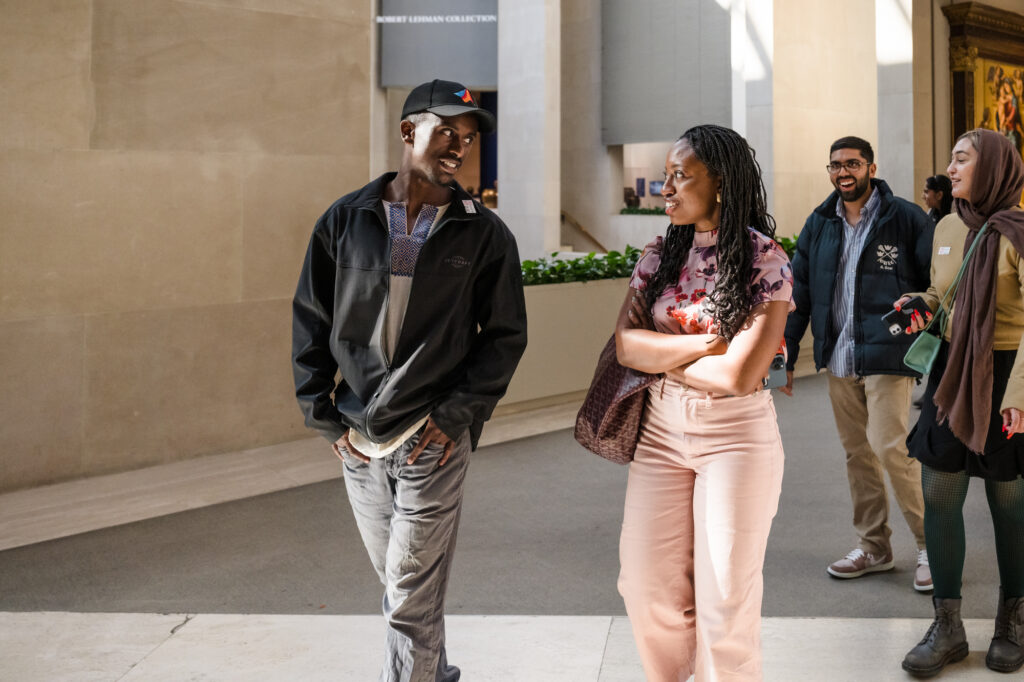
What’s the next step for you or what are the steps you’ve taken after graduating?
I am currently a second-year graduate student at Georgia Tech. I am pursuing a PhD in electrical and computer engineering, and a master’s in biomedical engineering, along with a master’s in earth and atmospheric science. Given that I am in the early stages of my graduate studies, I am not fully certain what my next step will be after graduation. However, I’m interested in joining a medical devices start-up to be part of developing the next cutting-edge bio-medical technologies.
Can you tell us more about your graduate studies — what questions were you/are you pursuing?
I started off my graduate studies by taking four more electrical and computer engineering courses and learning more about the physics behind microelectromechanical systems- (MEMS) based gas sensors developed in Dr. Oliver Brand’s iSenSys lab at Georgia Tech. This is mainly because of my major switch from my undergraduate degree in mechanical engineering. An interdisciplinary and multi-pronged approach is required in order to fully understand the scientific, medical, technological, and operational components of my proposed study. I wanted to achieve this by working collaboratively with other labs that are working in science studies such as particulate matter research and remote sensing science to understand what types of new approaches I needed to take to develop reliable, robust, and state-of-the-art gadget sensors. To this end, I started working with Dr. Sally Ng’s research group at Georgia Tech, which is developing a nationwide atmospheric measurement network for studying and characterizing ambient aerosols such as secondary organic aerosols (SOA). The project focuses primarily on the particulate matter phase and the ability to classify and characterize the airborne particles, allowing for both the identification of potentially hazardous effects and the partition coefficients involved in the phase transformations between the gas and particle phases, which are necessary for understanding chemical pathways in our environment. Currently, our lab’s proposed approach is a micro-thermogravimetric analysis system utilizing a MEMS-based resonant cantilever system with an embedded heater for the real-time recording of the mass of adsorbing particulate matter and its desorption through the use of controlled heating via the controlled application of power to the embedded piezoresistive heaters.
There are so many paths beyond college—why did you feel graduate school was the best next step for you personally and/or professionally?
After a profoundly transformative Research Experience for Undergraduates (REU) in Nanotechnology, supported by the NSF, I decided to pursue a degree in electrical and computing engineering. My ambition to pursue engineering research was strengthened by the REU program. I took part in a cutting-edge research effort to create gas sensors based on microelectromechanical systems (MEMS), which are frequently used in chemical sensing equipment to detect contaminants in the air and water. I’ve studied both modern additive nano-manufacturing methods as well as chemical microsensor technologies for this research. As I received practical experience for upcoming advanced studies, the REU also effectively prepared me for research-based study. The program also strengthened my social ties and helped me understand how to be connected and independent in my studies.
Dr. Oliver Brand—my PI and the Director of the Institute of Electronics and Nanotechnology (IEN)—helped me see my potential as a researcher after meeting the summer research project goals. I mostly give him credit for encouraging me to take the risk and go to graduate school. In my undergraduate years, I mostly focused on achieving financial stability, given that I had a family that relied on me. It was hard to take the risk of pursuing higher education, and he truly helped me figure it all out.
Over the past two years, what personal or professional accomplishment are you most proud of?
I am proud of establishing multiple lab collaborations to develop interdisciplinary research so that I am able to learn about various topics all at once. This will help me create a pathway for my research studies in the upcoming years. On the other hand, I continued working as a graduate mentor in the Peer-to-Peer program (P2P) at Georgia Tech, where I positively impacted the student community by communicating my research experience to motivate students with diverse backgrounds to pursue research. P2P is part of the Center for Engineering Education and Diversity (CEED) program, which focuses on students who are traditionally underrepresented in STEM fields. These experiences helped me to develop my virtues and leverage STEM as a means of building community relationships. Along with academic activities, they are becoming a defining moment in my development of social and leadership skills.
How do you describe The Paul & Daisy Soros Fellowships for New Americans program to others?
I think of the Fellowship program as a place where you can grow alongside a bunch of people that look like you. I also describe it as a place where people from many different academic backgrounds can get together to discuss and learn about a variety of issues.
Do you have any favorite memories from the past two years as a Paul & Daisy Soros Fellow?
My favorite memory from the Fellowship was the time we all learned how to karaoke at the 2022 Fall Conference that was held in New York City. In that instant, I felt as though I belonged not just to a Fellowship, but also to a loving and devoted family that would be there for the rest of my life, in both happy and difficult times.
What advice would you give to someone who is thinking of applying to The Paul & Daisy Soros Fellowships for New Americans?
My best advice for anyone applying for the Paul and Daisy Soros Fellowships is to talk about your broader impact in your community and field of study. Your essays should focus on your own work in addition to your college education rather than only focusing on your academic achievements, which they can usually see on your transcript. Second, make sure you have a variety of recommendation letters from the individuals you have worked with who are also familiar with you well enough to speak to your potential. This is crucial to demonstrate your wider impact.
Who has inspired you from the Paul & Daisy Soros Fellowship community?
Dr. Arun Mohan inspired me from the Fellowship community.
Has your sense of what it means to be a New American changed or shifted through the Fellowship experience and community?
Not really. I still believe being a New American for me is not different from what the immigrants that came through Ellis Island looking at the Statue of Liberty thought of: new life and opportunity. America is a unique experiment of unity across humanity that is the leading reality of a transcultural nation while promoting people from various backgrounds to work toward a bigger goal. When I arrived here, I felt welcome to embrace my academic aspirations along with my culture and identity simultaneously. Being a New American means getting a second chance in life to grow as a person among people who are willing to work for a greater cause in every aspect of humanity. ∎
Keep Exploring
-
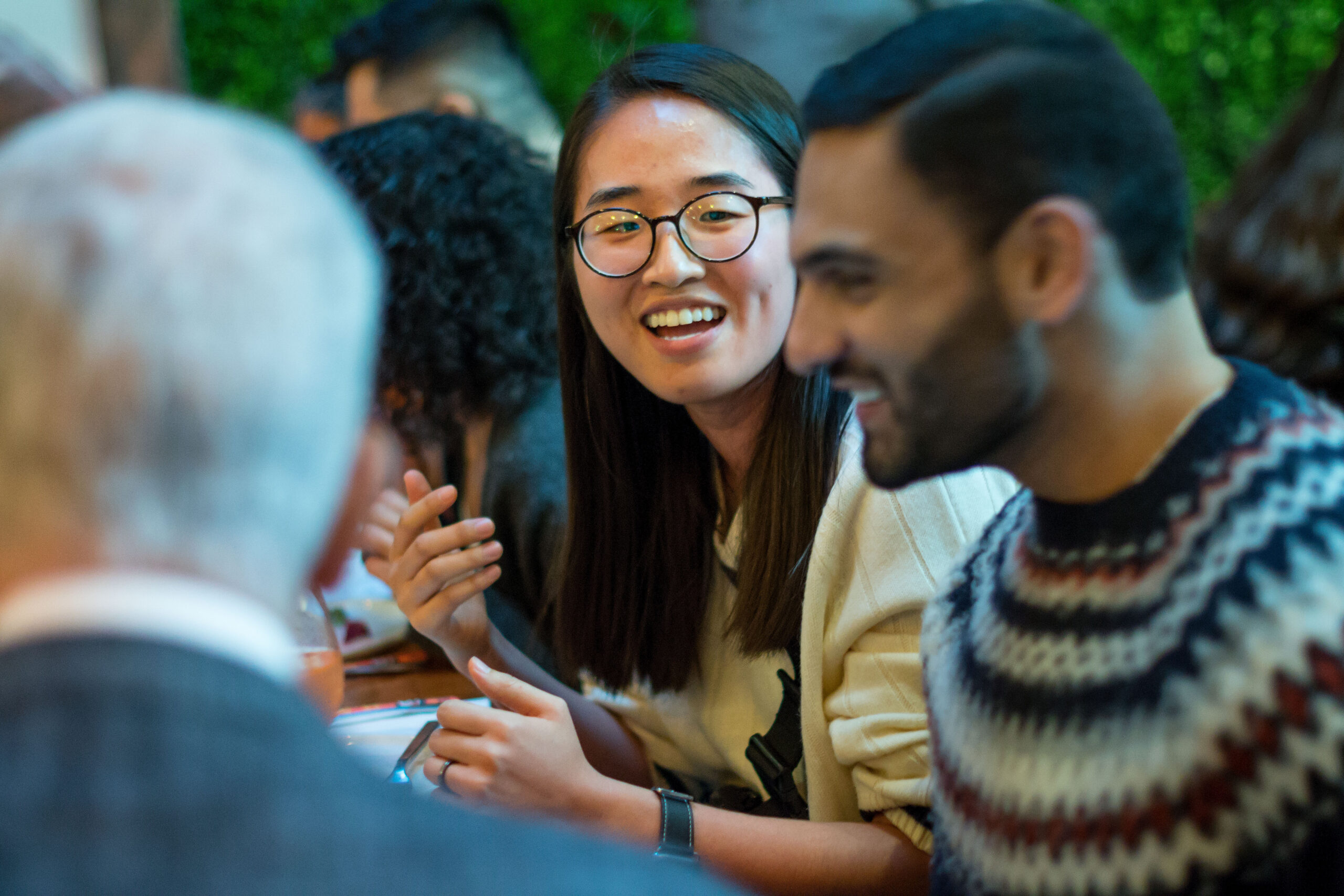 Read more: Kathy Ku Steps into Leadership as PDSFA Chair
Read more: Kathy Ku Steps into Leadership as PDSFA Chair- Board of Directors
- Fellowship News
Kathy Ku Steps into Leadership as PDSFA Chair
-
 Read more: Q&A with MD/PhD Student Silvia Huerta Lopez
Read more: Q&A with MD/PhD Student Silvia Huerta LopezQ&A with MD/PhD Student Silvia Huerta Lopez
-
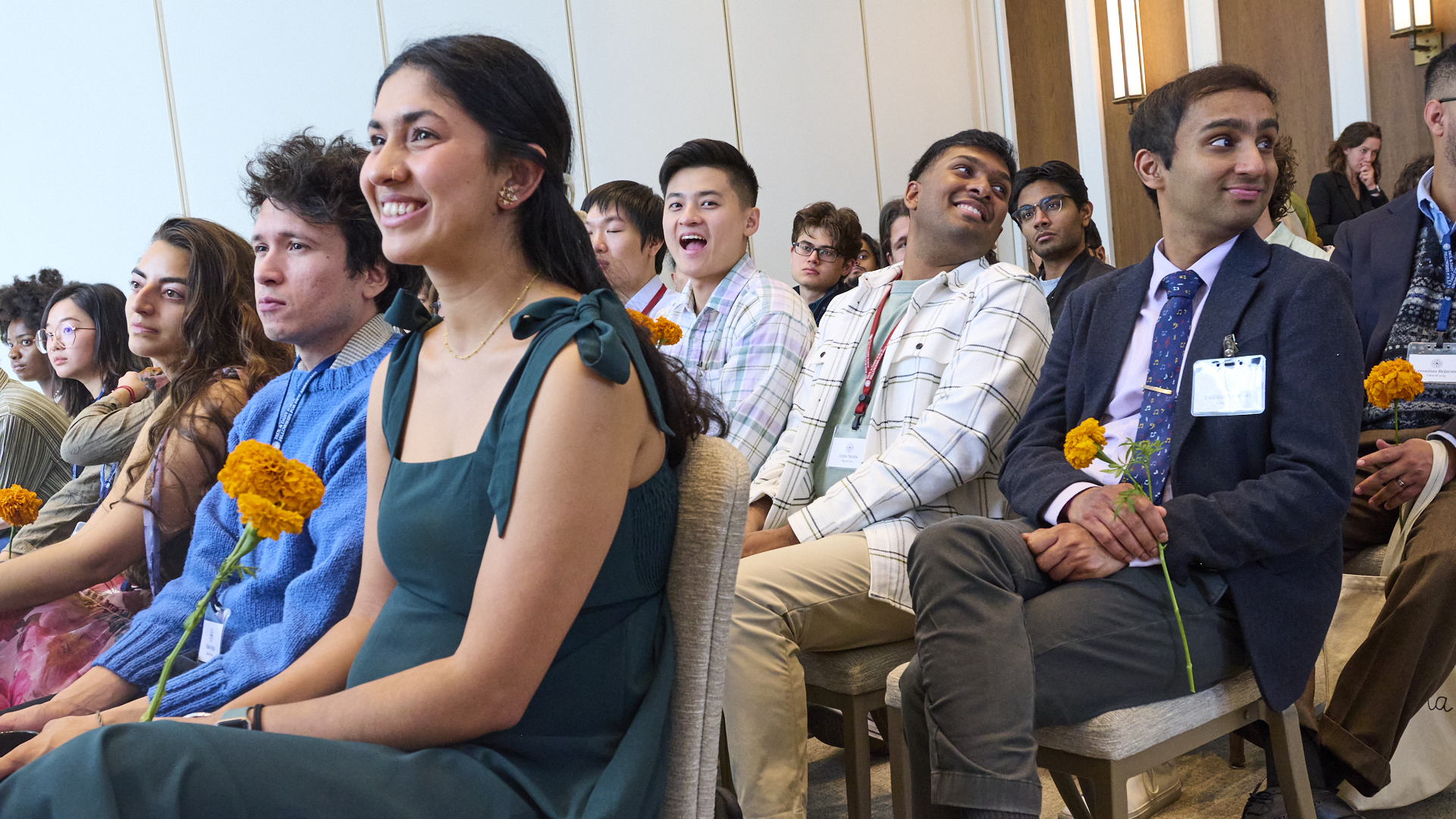 Read more: PD Soros Eligibility Guide for PhD Applicants
Read more: PD Soros Eligibility Guide for PhD Applicants- Applicant Information
PD Soros Eligibility Guide for PhD Applicants
-
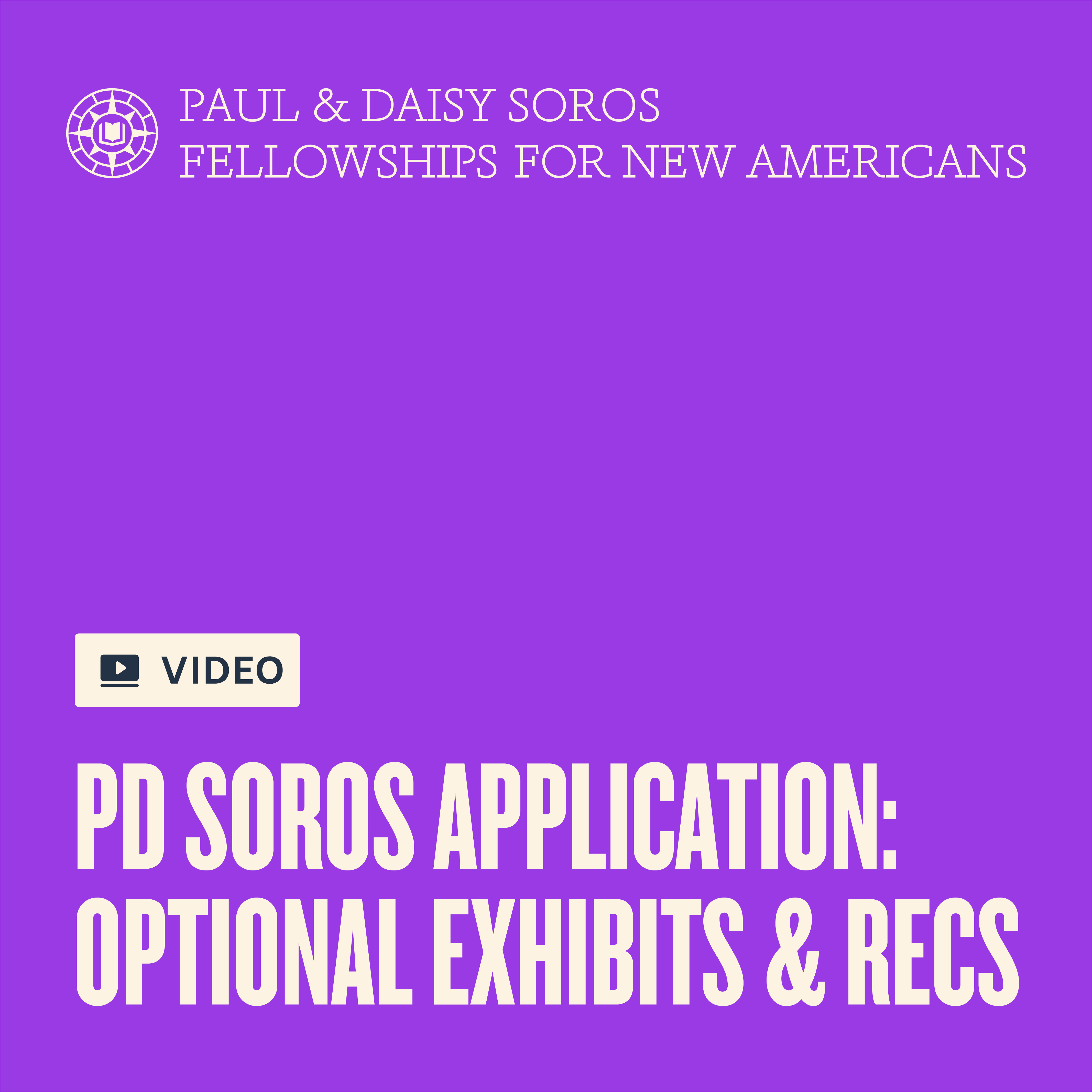 Read more: Watch: Optional Exhibits & Recommendations
Read more: Watch: Optional Exhibits & Recommendations- 2025 Information Sessions
Watch: Optional Exhibits & Recommendations
